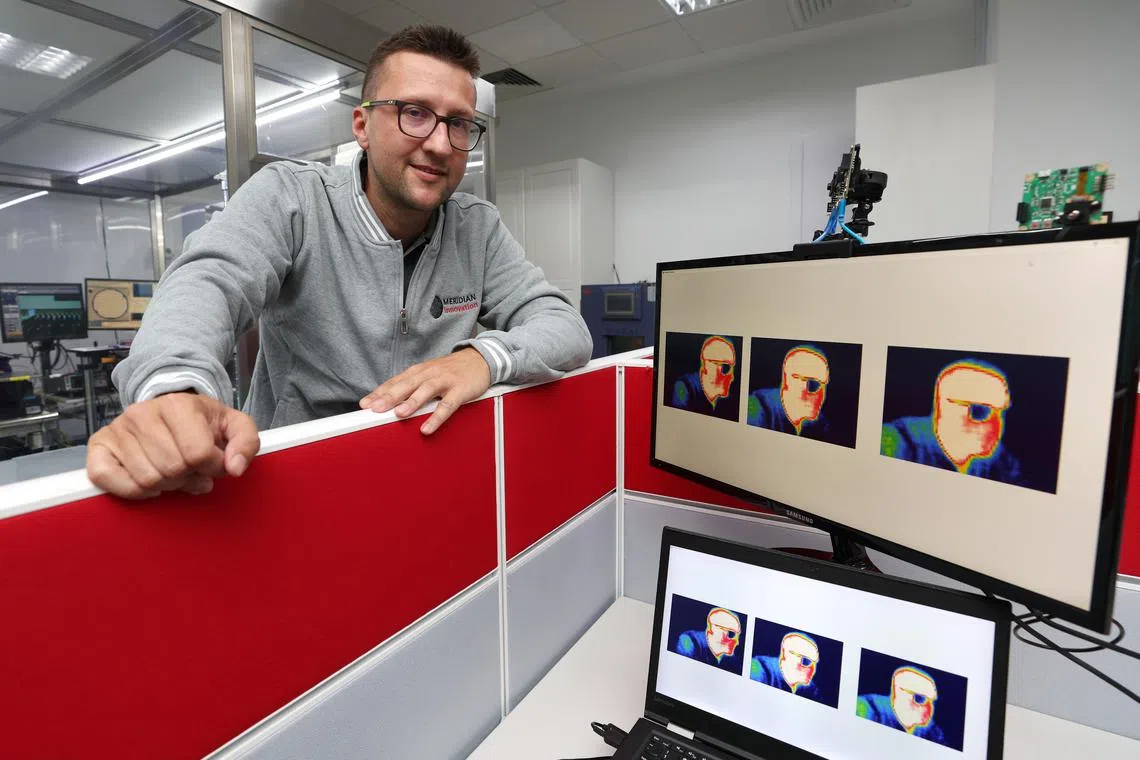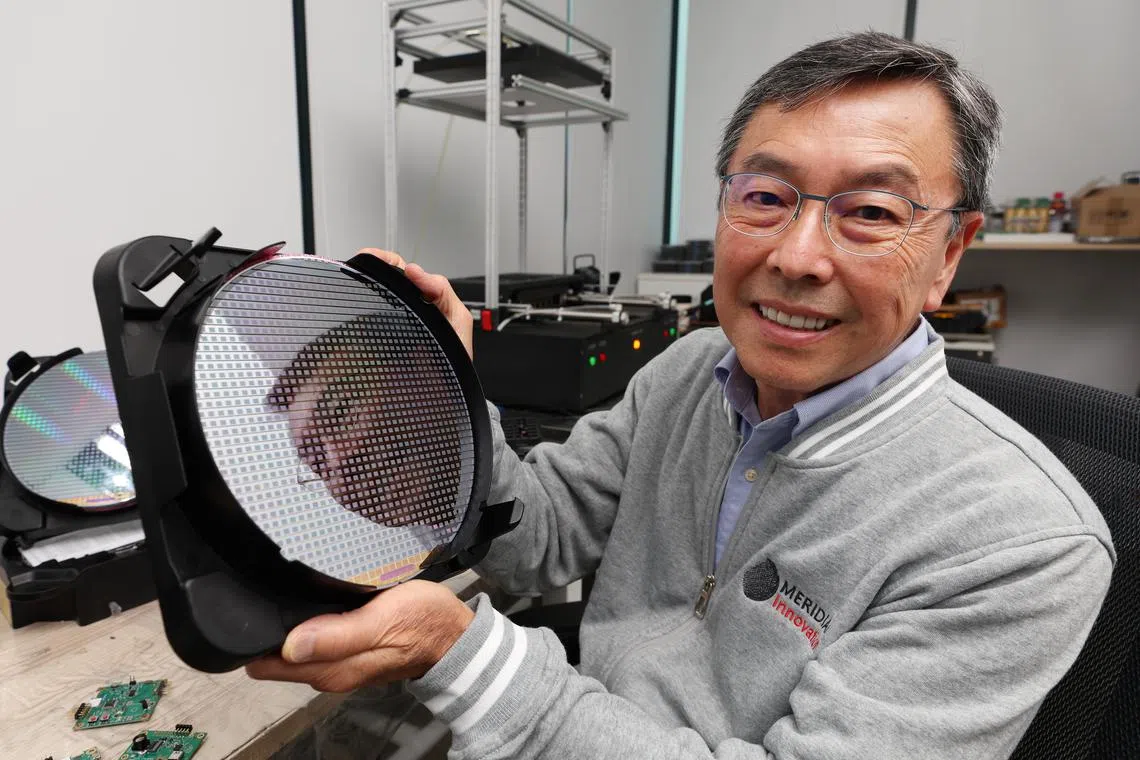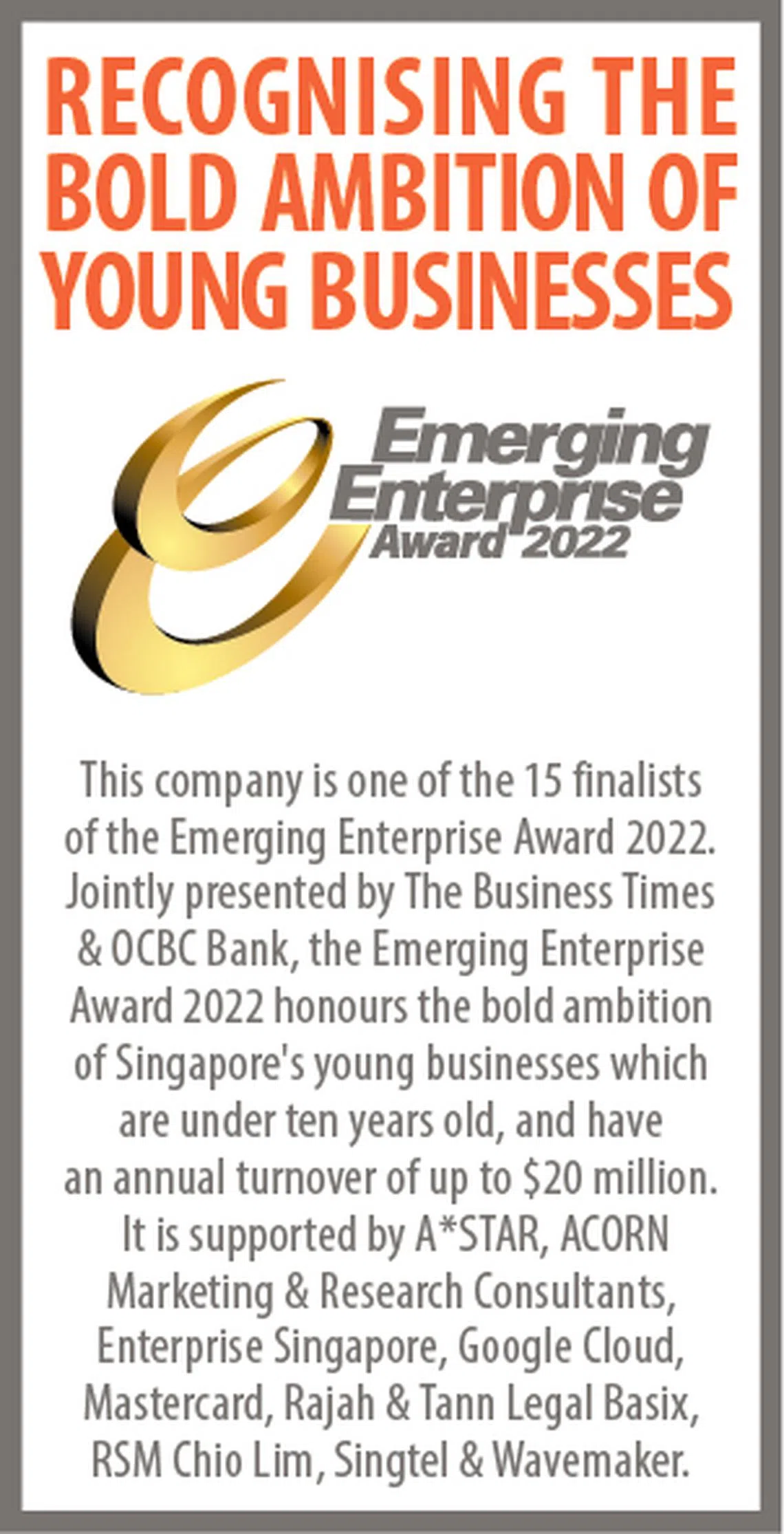Thermal sensor startup strikes while market is hot
LOW-COST thermal sensors could be a game changer across the manufacturing sector, from car parts to home appliances – and Singapore-based startup Meridian Innovation hopes to drive that change.
Earlier this year, Meridian signed a memorandum of understanding with German automotive manufacturer Continental to explore the use of its thermal imaging solutions for in-car safety monitoring. Meridian’s complementary metal-oxide-semiconductor (CMOS)-based sensors are an alternative to more expensive sensors that use vanadium oxide technology.
“Because we have such a unique and patented way of doing the thermal sensors using only CMOS, we felt that we have a sustainable advantage, long term, in the technology,” says chief executive and co-founder Leow Chon Hock. “It’s also in a whole new market that is waiting to be developed.”
“We felt like no competition was there, and it’s waiting for someone like us to come in.”
Meridian’s thermal imaging solutions use the same infrared heat detection seen in fever-detecting scanners during the Sars and Covid-19 pandemics. The company hopes to incorporate these solutions in temperature controls of smart home appliances such as microwave ovens.
Other potential uses include energy-efficient facilities management, health screenings, and elder care.
Navigate Asia in
a new global order
Get the insights delivered to your inbox.

With more than 20 customers signed and high-profile backers such as government agency Enterprise Singapore’s (EnterpriseSG) Seeds Capital investment arm, Meridian is racing to grow.
The company was formed in 2016 and began mass production of its first-generation sensors in 2020, followed by a second-generation product this August. Besides thermal sensor products, Meridian plans to develop environmental sensors that can measure gas concentrations.
Leow tells The Business Times (BT) that revenue is likely to reach US$15 million in 2023, which is also when he expects the company to turn profitable.
That would mark a huge turnaround from Meridian’s latest corporate records for its performance in the 12 months to Jun 30, 2021, when it made a net loss of about US$2.3 million on about US$999,500 in sales.
“It’s a big jump, it’s almost a 10-fold jump,” Leow acknowledges. But he thinks it can be achieved as “the second-generation sensor is starting to get a lot of traction from these large customers, because we’re hitting a price point that is so sweet for them to integrate into their product”.
“They are starting to believe our story – that with the right price point and the right performance, they can actually add more features that they were not able to, in whatever they’re doing.”
Meridian has already netted some US$18.3 million in investments. Besides Seeds Capital, backers include a subsidiary of Taiwanese electronics giant Foxconn; the investment arm of mainboard-listed Excelpoint Technology; and a unit of mainboard-listed Creative Technology, where Leow served as a long-time chief technology officer.
Creative Technology chief executive officer (CEO) Sim Wong Hoo has also thrown his weight behind Meridian, as has Excelpoint CEO Albert Phuay, through an investment vehicle.
‘Run fast, stay ahead’
Leow estimates that Meridian will need another US$10 million to US$15 million in investment “to get us to profitability”, for operating costs such as business development, software, manufacturing, and testing.
He tells BT that the company has already spent “more like $20 million so far” on its sensor project. Indeed, research and development (R&D) costs in FY2021 were nearly US$2.4 million.
Still, Leow adds: “If you take a large company to do the same thing, I wouldn’t be surprised if they’d be spending three times of what we’re spending, because we try to maximise every penny.”
On top of following up with existing investors, he is “also looking at bringing in new investors that can be more strategic in helping us”.
“We set a goal for ourselves: Every six months, we’re going to have a new product. The reason is, to just use patents as a defensive mechanism is not enough,” he says.
“We really need to run fast. That’s our mantra: to run fast to stay ahead of our competition.”

Leow discloses that the company is targeting an end-market for thermal sensor modules that cost about US$10 apiece – higher-end, but not military-grade – and touts the cost point and “supply security” of Meridian’s products as an advantage over competitors.
Meridian designs its thermal sensor solutions in-house, and – in what is known as a “fabless” production model, as they do not operate their own fabrication plant – outsources the sensor and camera module manufacturing to partners in Singapore and Taiwan.
The sensors are “offered in a proprietary wafer-level vacuum package”, says Meridian’s website – meaning that customers can buy this ready-made combination of chip and sensor, instead of getting each separately.
The company management tells BT that competitors have to use specific fabs so sensors can be attached to chips, whereas Meridian’s ability to integrate the sensor into the chip enables them to be more flexible in production.
Piotr Kropelnicki, Meridian’s vice-president of engineering, elaborates that “the beauty of our process is, we can go to any fab”, as their materials and technology are compatible with a variety of industry fabrication plants.
Semiconductor technology may have become a flashpoint in geopolitics, but Dr Kropelnicki is unfazed: “We proved that our process can be implemented in any standard CMOS process. Let’s say there was a geopolitical problem. We can actually say, ‘Okay, we’ll port our technology to another fab’, so we are very flexible in this manner.”
Meridian’s finance and R&D are headquartered in Singapore, where close to half of its 46 employees are based, while software development and other business functions are carried out in Taiwan, Hong Kong, and mainland China. The company also has a presence in the US – where Leow and co-founder and chief operating officer Hasan Gadjali, both American citizens, are based – for business development.
To support the company’s expansion, the engineering headcount could be raised from roughly 20 now to “double, triple, or even more” in the next few years, says Dr Kropelnicki.
Dr Kropelnicki, who was formerly a scientist at the Agency for Science, Technology and Research’s Institute of Microelectronics, adds that the startup is working with EnterpriseSG, universities, and fabs here “to grow the environment and the interest for young people to become engineers and experts in semiconductors”.
“It’s important, in semiconductors, to actually see what is the next thing that can obviate the previous one,” says Leow. Suggesting that CMOS-based sensors mark “the new trajectory for sensors”, he muses that Meridian could partner other companies to help turn Singapore into a hub for “smart sensors for the world”.

Decoding Asia newsletter: your guide to navigating Asia in a new global order. Sign up here to get Decoding Asia newsletter. Delivered to your inbox. Free.
Copyright SPH Media. All rights reserved.

